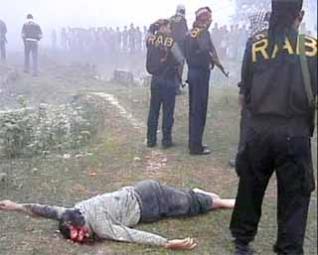Subscribe to ShahidulNews
by rahnuma ahmed
`A state within the state is now ruling the country.‘ Recently uttered by Dr Mizanur Rahman, National Human Rights Commission chair, these words, ominous as they sound, are of immense concern to the nation’s citizenry.
To those who love this country. Who feed off its soil, off the labour of those who plant, grow, nurture, feed us. What sense can one make of his words?
Dr Mizan was speaking at a roundtable on granting constitutional recognition to indigenous people but his words were occasioned by something else. An incident which is proving to be the turning point.
Yes, Limon. People across the nation are outraged. At the shooting. If possible, more so, at the subsequent cover-up attempts by some ministers, by a senior civil-military leadership nexus.
Cover-up? How else but by `criminalising’ the victim? Limon is a `terrorist’, his father’s a `terrorist’. The whole family is nothing but a bunch of terrorists.
Limon’s left leg had to be amputated after the 16-year old Jhalokathi college student, the son of an agricultural day-labourer, was allegedly shot in the leg by RAB’s officers on March 23. RAB claims, the shooting occurred during an `encounter’.
But the real problem, from RAB’s perspective, is that Limon has lived to tell the tale. Unusual, for RAB’s victims generally don’t. Human rights activists allege, since the formation of the elite anti-crime, anti-terror force in 2004, the number of extra-judicial killings has crossed a thousand. Continue reading “`State within the state.' Militarisation, and the women's movement”

